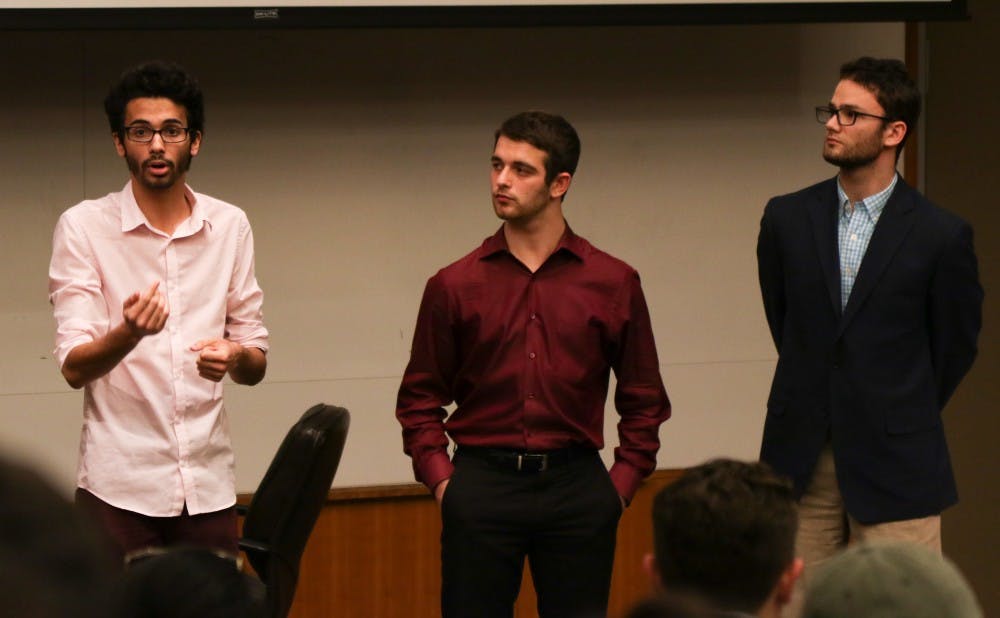At Wednesday’s Duke Student Government meeting, the Senate confirmed nominees for president pro tempore, the Board of Elections and executive secretary.
Current President Pro Tempore Jackson Dellinger, a junior, detailed “three primary roles” of president pro tempore—running Senate, managing internal affairs and representing Senate to the executive board. His responsibilities include “making sure things run as smoothly as possible,” interacting with the Judiciary and “understanding why they do the things they do” and “to speak out” if the actions of the executive board “contradict or rebut the feelings of the Senate.”
Sophomore Avery Boltwood, senator for campus affairs, will be the president pro tempore for the upcoming academic year.
“The one goal I want to set is to develop a system of caucuses within the Senate," Boltwood said. "I think these will be standing bodies that will allow individuals of marginalized communities and other interest groups an easy point of contact in the senate for when they have issues that arise specific to them and for helping senators organize across committees on those issues."
Boltwood added that he also would like to set higher standards for institutional memory. He noted that many committees do not have a lot of memory that carries from year to the next.
He emphasized the importance of diversifying senate. By being able to encourage caucuses to supplement senate session, Boltwood said that they will “give marginalized communities a say.” Additionally, he would “talk to those people personally… so we know that people can come to us, and we can come to them.” With the authority to control Senate debate, Boltwood said he would “think about who [he is] calling on,” as calling on the “same person reinforces that person’s beliefs.
“I would promote direct outreach and having clear institutions that say that there is a place for you,” Boltwood said. “I would encourage people, when they have ideas to go out and speak.”
Currently, the materials for the Senate session are released the night before. Boltwood said that this makes it “hard [for senators] to form an opinion.” Instead, Boltwood would upload the agenda to the DSG Google Drive at an earlier time.
When asked about his stance on dress code, Boltwood responded that “people should be taken seriously no matter what they are wearing.”
Boltwood spoke to his experiences serving on internal affairs and chair of the Senate Judiciary Committee. He entered SJC without “nothing to fall back on,” relying upon contacting past members for advice.
“In the Senate judiciary committee, we had basically nothing to work with except for what was written in the constitution and the by-laws," Boltwood said. "Starting from scratch every year is inefficient, so that is an area to improve."
First-year Andrew Carlins, senator for academic affairs, and junior Sean Bissell, vice president of academic affairs, were also president pro tempore nominees.
New members to the Board of Elections are first-year Peter Laboy, senator for campus life, senior Kevin Mutchnick, senator for academic affairs, Valeria Silombri, senator for Durham and regional affairs, and junior Kayla Thompson, senator for campus life.
First-year Turner Jordan, senator for Durham and regional affairs, was confirmed as executive secretary. Jordan has served on the Board of Elections since the beginning of the academic year and said that he believes there need to be “more concise” standards for senatorial attendance, including revised classifications of excused and unexcused absences.
“I think it is very important to have an engaged senate and make sure every is coming on a regular basis,” Jordan said.
In other business:
The Senate had its second reading of the DSG Constitution in which Dellinger presented a “suite of changes.” Mutchnick proposed an amendment to change the wording of the executive board to “board of branch leaders,” to minimize confusion about the executive branch encompassing the committee vice presidents. The amendment did not pass, and the “suite of changes” were passed on a two-thirds vote. Dellinger said that these changes “do not make” the amended Constitution “set in stone.”
The Senate funded Amnesty International $1,550, Blue Devils United $6,845, Street Medicine $1,754 and Duke Catholic Center $4,390 for an Easter Sunday brunch and $1,710 for a speaker event. Carlins proposed an amendment to remove the line item for funding Cameron Stadium’s bleachers pads for the DCC’s Easter Sunday brunch, but it was not passed.
The Board of Elections was allocated $875 from the DSG surplus fund for its the 2018 Election Day Turnout event, including $75 for FedEx color printed flyers and $800 for food items.
An event for Common Hour Two was given $950 from the surplus–pending the SOFC funds “are not transferred in time for the event.”
“Once the student body is notified of the changes, they will be added to the ballot for next week’s election,” Dellinger said.
Senior Elizabeth Barahona, vice president of equity and outreach, said that she along with Thompson and Mutchnick will meet with Dean Christoph Guttentag, dean of admissions, about ending legacy admissions.
“We want to pass a resolution so DSG is on board with ending legacy admissions,” Barahona said. “We wanted to conduct a straw poll [to observe your support].”
A majority of senators raised their hands in favor of such a resolution.
Get The Chronicle straight to your inbox
Signup for our weekly newsletter. Cancel at any time.

Stefanie Pousoulides is The Chronicle's Investigations Editor. A senior from Akron, Ohio, Stefanie is double majoring in political science and international comparative studies and serves as a Senior Editor of The Muse Magazine, Duke's feminist magazine. She is also a former co-Editor-in-Chief of The Muse Magazine and a former reporting intern at PolitiFact in Washington, D.C.

